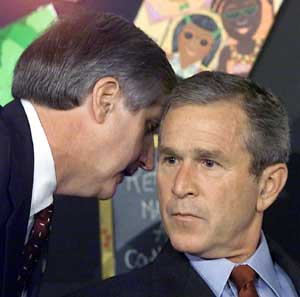 The world got a rare opportunity ten years ago to glimpse the face of a world leader the instant he learned his world had changed. When chief of staff Andrew Card whispered to President George W. Bush that a second plane had crashed into the World Trade Center, while he was sitting there trying to be a good sport in watching the progress of an elementary school in Florida.
The world got a rare opportunity ten years ago to glimpse the face of a world leader the instant he learned his world had changed. When chief of staff Andrew Card whispered to President George W. Bush that a second plane had crashed into the World Trade Center, while he was sitting there trying to be a good sport in watching the progress of an elementary school in Florida.
Rather than slap his head and say “Terrorist attack!” he cocked his head, looked stiffly and seemed to be trying to figure out what it all meant. He froze for a moment. He wasn’t into the kids’ lesson any more and he was not a very good guest any longer.
Much has been made of those minutes Bush sat there before he got up and tried to get information or order something be done. But, having 10 years to settle on a story for the official record in what is being hyped as his first and only interview on the subject, he says he merely didn’t want to startle the children.
(With all the death and destruction in New York, you don’t want to compound it by startling children).
Peter Schnall, the unseen interviewer in “George W. Bush: The 9/11 Interview” (National Geographic, 9 p.m.) doesn’t press him on it. Like the interviewers on Fox News for another Bush interview coming up, he was more interested in how Bush felt.
“I asked him what it felt to be the President sitting basically in front of the world’s stage by himself, alone, up in front of the kids, and being told something that perhaps most other presidents would learn about, say, in the Oval Office or in a bunker, being told that the United States is under attack. And this was his response,” Schnall said in a press conference last month. “What I tried to do was get a sense of what he was really thinking at that moment.”
As in an earlier National Geographic special that may have paved the way for this one, “Giuliani’s 9/11,” the central figure gets to expound on his view of events entirely, to the exclusion of other points of view, supplemental interviews, or any other voices at all, as a matter of fact.
No interview arrangement is so accommodating to its subject.
 Schnall says he ingratiated himself to the Bush administration by making a couple of films ostensibly about his plane “On Board Air Force One,” where Bush was expansive about the plane in which he rode.
Schnall says he ingratiated himself to the Bush administration by making a couple of films ostensibly about his plane “On Board Air Force One,” where Bush was expansive about the plane in which he rode.
Appearing in close up against a black backdrop, there is intense scrutiny on Bush, who looks a bit older and his hair a little scruffy. And all the unusual decisions to fly around the country as that shocking day unfolded are explained for the first time: The Secret Service made him do it.
For all the access, from two days of interviews, there seems something strangely incomplete in the one hour finished product. There must be more to say. Or maybe this is all he’ll ever say about that day until his own memoir.